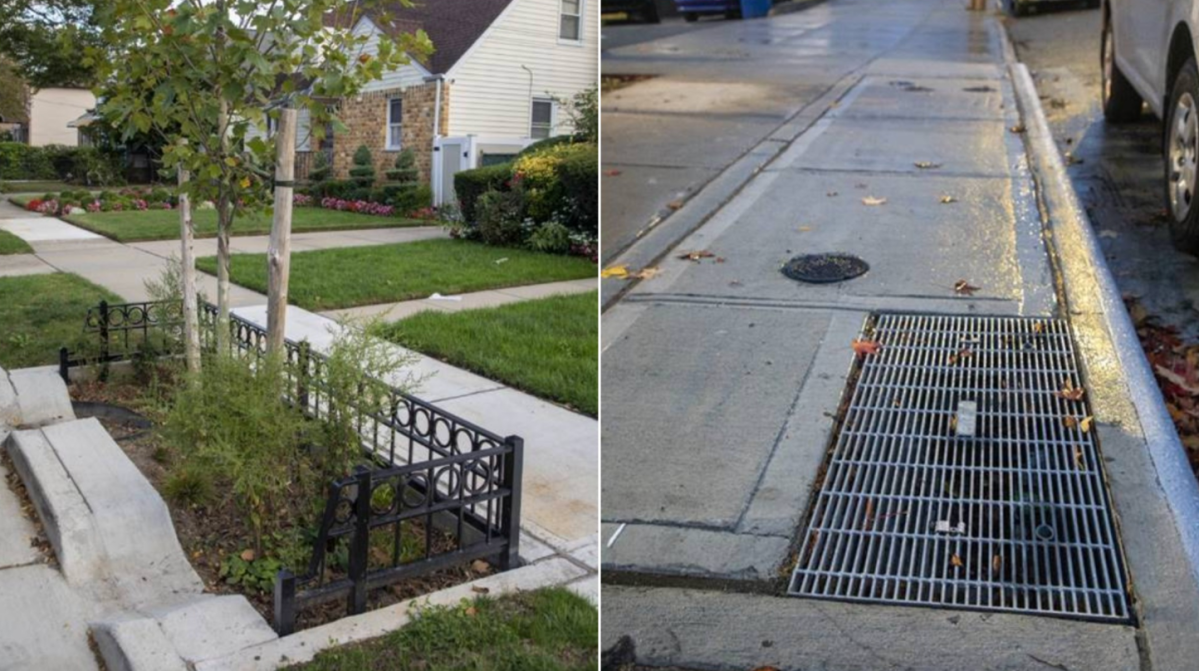The city Department of Environmental Protection (DEP) has completed construction of 170 specially designed curbside rain gardens and infiltration basins to reduce roadway flooding in southeast Queens neighborhoods.
Each installation in the neighborhoods of Queens Village, Wayanda and Cambria Heights has the capacity to collect and absorb up to 2,500 gallons of stormwater during each rainstorm, according to the DEP. It is estimated that in total, over 17 million gallons of stormwater can be captured annually.
DEP Commissioner Vincent Sapienza said the department is investing $1.9 billion in a comprehensive draining system to combat flooding and improve the quality of life for residents and businesses in southeast Queens. The program consists of 45 sewer projects overall, including 10 that are substantially completed and 11 that are in active construction.
“Stormwater management in New York City requires a multi-faceted approach, which is why we are building out a comprehensive drainage system as well as green infrastructure, including rain gardens, to naturally absorb stormwater,” Sapienza said.
Councilman Daneek Miller said he’s pleased that the DEP is continuing to make progress installing flood mitigation tools during the pandemic.
“Southeast Queens residents have struggled for years with routine flooding, and it’s more important than ever that we address these quality-of-life issues and support our homeowners in every way we can,” Miller said.
Senator Leroy Comrie said stormwater management is a core solution to the issue of chronic flooding in southeast Queens.
“I thank Commissioner Sapienza and his team at DEP for developing and installing these curbside stormwater absorption resources in our communities,” Comrie said.
Rain gardens supplement a robust drainage system and are built in city sidewalks and do not result in the loss of any parking spaces.
Infiltration basins mimic existing sidewalk conditions and can have either a grass or concrete top. Like rain gardens, they vary in size, have curb cuts that allow stormwater to enter and overflow if they become saturated, and have been designed in a way that will allow them to manage up to 2,500 gallons each during a storm.
In partnership with the Departments of Transportation and Parks and Recreation, DEP conducts an extensive site selection process that includes geotechnical investigations and surveys.
During construction, the rain gardens and infiltration basins are excavated to a depth of about 5 feet and are then backfilled with layers of stone and engineered soil. These layers contain void spaces that store the stormwater and promote infiltration.
The addition of hardy plants further encourages infiltration through root growth and increases the capacity of the rain garden through evapotranspiration.
Green Infrastructure is specifically designed so that all the stormwater is absorbed in less than 48 hours and dedicated maintenance crews ensure that they are functioning properly, including removing any trash that may have accumulated and pruning the trees and plants.
DEP has also conducted extensive outreach in the Jamaica Bay watershed area, including briefing City Council members, community boards and numerous other neighborhood and environmental organizations. These meetings help to inform communities about the purpose of green infrastructure and the benefits it will bring to their neighborhoods, as well as plans for future construction
Mark McMillan, district manager of Community Board 13, said they welcome the attention of DEP with the rain gardens and infiltration systems as innovative and unobtrusive ways to address the flooding issue.
“Being part of the Jamaica basin, it is important that these remedial measures are put in place to protect property and to assure that residents can comfortably enjoy the biggest investments most people have — their homes,” McMillian said.



































